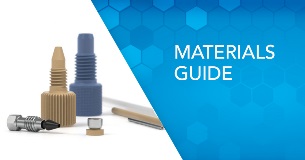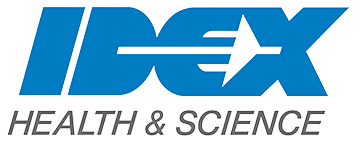

Use the left hand navigation to filter resources by Topic and Media Type.
-
Selecting Filters for Fluorescence Multiplexing
By IDEX Health & ScienceThe steady advances in optical thin film deposition technology over recent decades have enabled production of high performance multiband optical filters that address the increasing demand for multicolor fluorescence instrumentation. Though there is now a wide range of available catalog filters designed for a large variety of fluorophores, selecting suitable filters is often a complex process. Here we present considerations relevant to the design of such a multiplexing system. Learn More
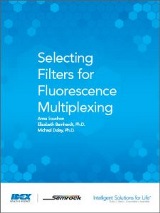
-
Maximizing the Performance of Advanced Microscopes by Controlling Wavefront Error Using Optical Filters
By IDEX Health & ScienceAny imaging instrument has a limited tolerance for wavefront error – and every optical element in the light path (including dichroic beamsplitters) contributes to wavefront error, thereby limiting overall imaging system performance. When aiming to achieve diffraction-limited imaging performance or better, it is important to consider wavefront errors from all optical elements in order to calculate the total instrument wavefront error, and to compare it to the maximum allowable value. Learn more in this white paper. Learn More
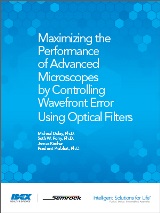
-
Tubing Cutter How-To-Guide
By IDEX Health & ScienceThe IDEX Health & Science Polymeric Tubing Cutter is designed to work on all types of polymeric tubing, including Teflon®, Tefzel®, and PEEK™ polymers. It is engineered with guide holes for both 1/16" and 1/8" outer diameter (OD) tubing, to ensure a flat, even tubing cut. Use this how-to-guide for best practices to score and snap a piece of polymeric tubing, as well as, how to replace the blade on the unit. Learn More
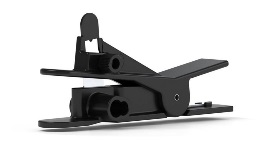
-
Filter Spectra at Non-normal Angles of Incidence
By IDEX Health & ScienceWhile most applications call for optical filters to be used at normal incidence, it is important to understand how the spectral properties of different types of filters change when using these filters a non-normal angles of incidence (AOI). There are two main effects exhibited by all filter spectrum as the angle is increased from normal which are discussed in this article. Learn More
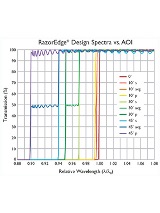
-
Comprehensive Guide to Check Valves: A Critical Component of HPLC Pumps
By IDEX Health & ScienceCheck valves are critical to HPLC pump performance, as they prevent any backflow and ensure maximum pumping efficiency. Discover critical elements related to the functional performance of a check valve and ultimately the overall chromatography results. Learn More
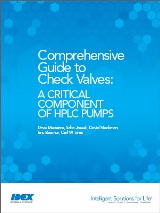
-
Fluidics Brochure
By IDEX Health & ScienceIDEX Health & Science specializes in directing fluid to where it needs to be, so you can automate your fluidic process in a simple package and form factor. Our team of experts has decades of experience in life science applications to help you avoid pitfalls across a broad range of operations and accelerate your time to market. Learn More
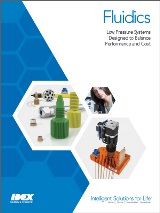
-
Say Hello to the Newly Revised Fittings 101 Guide!
By IDEX Health & ScienceDive into the world of fluidic fittings and chromatography with our newly revised Fittings 101 Guide. Learn the fundamentals of equipment fittings and accessories, as well as some basics about liquid chromatography as an analytical technique. Learn More
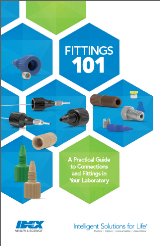
-
Introduction to Fluorescence Filters
By IDEX Health & ScienceFluorescence occurs when a molecule absorbs light at wavelengths within its absorption band, and then emits light at longer wavelengths within its emission band. For example, brightly fluorescent molecules (called fluorophores) can be attached to biologically significant molecules in e.g. cell membranes, in the brain, or even on subunits of DNA, whose structures become visible in a fluorescence microscope that allows us to track the way cells function in health and disease. Fluorescence is widely used in biology, biotechnology, and medicine, due to its extraordinary sensitivity, high specificity, and simplicity of usage. Learn more about what optical filters are included in a fluorescence instrument and how Semrock optical filters can optimize your application. Learn More
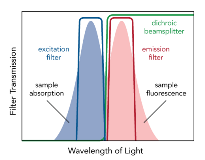
-
Chemical Compatibility
By IDEX Health & ScienceThis Chemical Compatibility section will allow you to either check what materials will work with the chemicals you are using or planning to use; or view what compatibility ratings are given to a material you are planning to use. Learn More
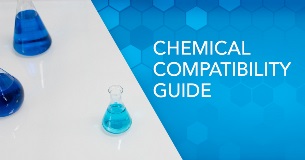
-
Materials Guide
By IDEX Health & ScienceExplore our material properties guide by selecting the material of your choice from the list provided to view properties and solvent compatibility Learn More
